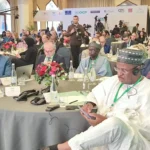By Justina Auta
Nigeria and seven African countries have commenced a vaccine initiative aimed at addressing the burden of HIV infections on the continent.
The initiative, titled ‘Bringing Innovation to Clinical and Laboratory Research to End HIV in Africa through New Vaccine Technology (BRILLIANT)’, is focused on HIV vaccine research and development.
Prof. Alash’le Abimiku, Executive Director of the International Research Centre of Excellence at the Institute of Human Virology (IHVN), announced this at a press briefing on Thursday in Abuja.
The theme of the briefing was ‘HIV Vaccine, Innovation, Science, and Technology Acceleration in Africa (HIV-VISTA) Study’.
Abimiku identified the participating countries as Nigeria, South Africa, Zambia, Zimbabwe, Tanzania, Uganda, Kenya, and Mozambique.
The consortium’s objective is to evaluate HIV vaccine candidates developed within Africa.
She explained that the initiative seeks to empower African scientists to contribute to an effective HIV vaccine.
“Through these efforts, African institutions will be encouraged to become more autonomous, generate domestic resources, and form partnerships with the private sector.
“This may create a more sustainable system for HIV vaccine research and development, reducing the current reliance on U.S. government support,” she said.
Abimiku expressed optimism that the partnership would highlight Africa’s potential for innovative solutions to global health challenges, particularly those disproportionately affecting the continent.
Dr Temitope Ilori, Director-General of the National Agency for the Control of AIDS (NACA), said in spite extensive efforts, HIV continues to persist, hence the need for new preventive tools.
“The agency has consistently provided preventive measures, but an effective vaccine is crucial to our efforts.
“The HIV-VISTA study offers hope for a vaccine tailored to the needs of our population, and Nigeria’s involvement in this global initiative is essential.
“Our participation supports both local and international efforts to end AIDS, bringing us closer to a vaccine that could save countless lives across Africa and beyond,” she said.
Dr Ezekiel James, Deputy Director of the Office of HIV/TB at USAID, stated that the study creates an opportunity for stakeholders to collaborate in the drive toward HIV epidemic control.
Dr Leo Zekeng, UNAIDS Country Director, underscored the importance of engaging communities to raise awareness about HIV vaccines and ongoing research aimed at reducing HIV transmission rates.
The World Health Organisation (WHO) had on Tuesday named HIV, malaria, Tuberculosis, and 14 other pathogens as top priorities for new vaccine development.
UNAIDS reports that an estimated 39.9 million people were living with HIV globally in 2023, with about 1.3 million new infections.
Africa bears approximately 65 per cent of this burden, with Nigeria accounting for 1.9 million cases, making it the fourth-largest contributor to the global HIV burden.
The U.S. Agency for International Development (USAID) awarded over $45 million to the BRILLIANT consortium through a competitive process to implement a cooperative agreement under the HIV-VISTA project. (NAN) www.nannews.ng.com
Edited by Kadiri Abdulrahman












